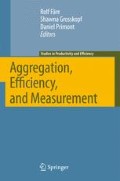Abstract
Recently Bob Russell published an impossibility result with Chuck Blackorby. The gentlemen argue that it is impossible to aggregate efficiency indices. Since some of us make a descent living decomposing the efficiency of an economy into sectoral contributions the question is if we are crooks. This paper attempts to give an answer to this question.
Access this chapter
Tax calculation will be finalised at checkout
Purchases are for personal use only
Preview
Unable to display preview. Download preview PDF.
References
Blackorby, Charles and R. Robert Russell, “Aggregation of Efficiency Indexes”, Journal of Productivity Analysis 12 (1999) 5–20.
Charnes, A., W.W. Cooper, and E. Rhodes, “Measuring the Efficiency of Decision Making Units”, European Journal of Operational Research 2 (1978) 419–444.
Debreu, Gerard, “The Coefficient of Resource Utilization”, Econometrica 19(3) (1951) 273–292.
Diewert, W. Erwin, “The Measurement of Waste Within the Production Sector of an Open Economy”, Scandinavian Journal of Economics 85(2) (1983) 159–179.
Fare, Rolf, and Shawna Grosskopf, New Directions: Efficiency and Productivity, Kluwer, Boston, 2004.
Farrell, M.J., “The Measurement of Productive Efficiency”, Journal of the Royal Statistical Society Series A, 120(111) (1957) 253–281.
Førsund, Finn R., and Nikias Sarafoglou, “On the Origins of Data Envelopment Analysis”, Journal of Productivity Analysis 17 (2002) 23–40.
Johansen, Leif, Production Functions, North-Holland, Amsterdam, 1972.
Jorgenson, Dale W., and Zvi Griliches, “The Explanation of Productivity Change”, Review of Economic Studies 34(3) (1967) 308–350.
ten Raa, Thijs, Debreu’s Coefficient of Resource Utilization, the Solow Residual, and TFP: The Connection by Leontief Preferences, CentER DP 111, 2003
Wolfe, Philip, “A Duality Theorem for Nonlinear Programming”, Quarterly of Applied Mathematics 19(3) (1961) 239–244.
Zieschang, K., “An Extended Farrell Technical Efficiency Measure”, Journal of Eco nomic Theory 33 (1983) 387–396.
Author information
Authors and Affiliations
Editor information
Editors and Affiliations
Rights and permissions
Copyright information
© 2007 Springer Science+Business Media, LLC
About this chapter
Cite this chapter
ten Raa, T. (2007). Don’t Aggregate Efficiency But Disaggregate Inefficiency. In: Färe, R., Grosskopf, S., Primont, D. (eds) Aggregation, Efficiency, and Measurement. Studies in Productivity and Efficiency. Springer, Boston, MA. https://doi.org/10.1007/978-0-387-47677-3_9
Download citation
DOI: https://doi.org/10.1007/978-0-387-47677-3_9
Publisher Name: Springer, Boston, MA
Print ISBN: 978-0-387-36948-8
Online ISBN: 978-0-387-47677-3
eBook Packages: Business and EconomicsEconomics and Finance (R0)

